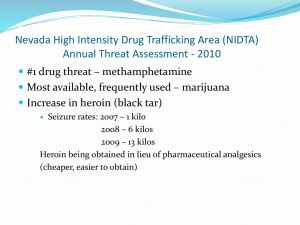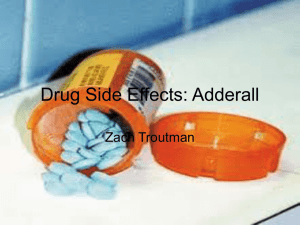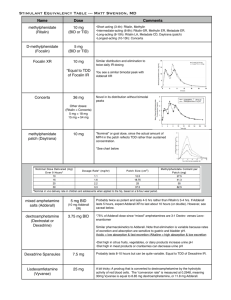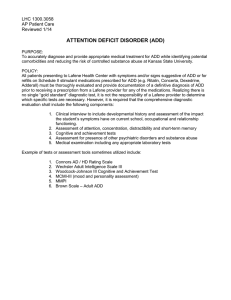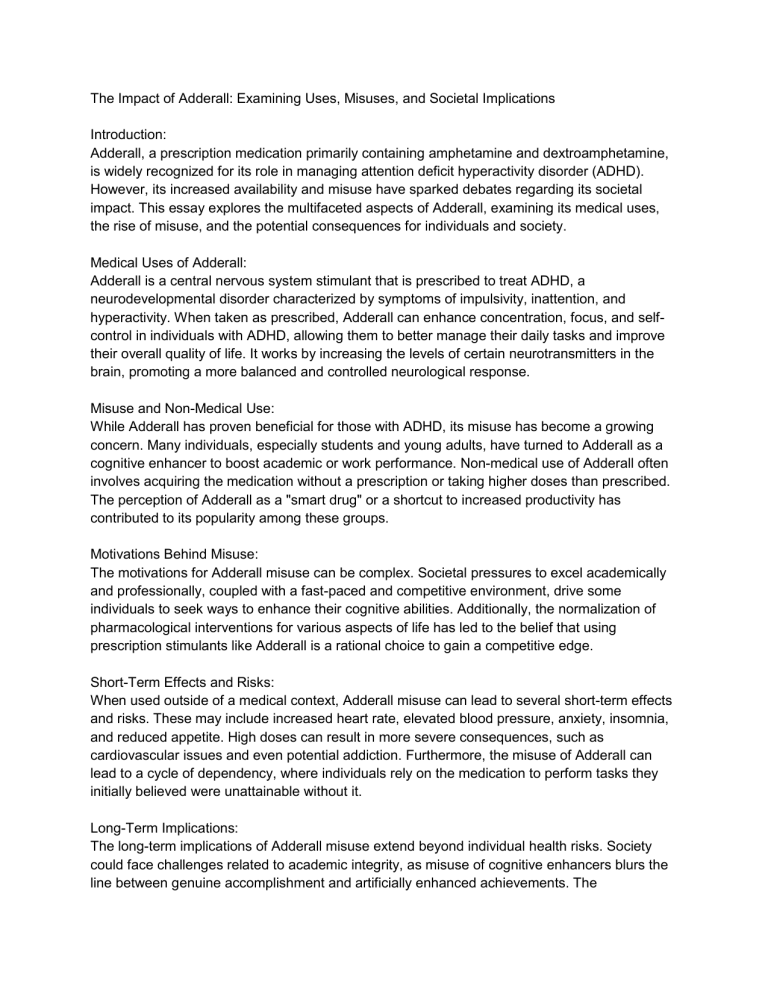
The Impact of Adderall: Examining Uses, Misuses, and Societal Implications Introduction: Adderall, a prescription medication primarily containing amphetamine and dextroamphetamine, is widely recognized for its role in managing attention deficit hyperactivity disorder (ADHD). However, its increased availability and misuse have sparked debates regarding its societal impact. This essay explores the multifaceted aspects of Adderall, examining its medical uses, the rise of misuse, and the potential consequences for individuals and society. Medical Uses of Adderall: Adderall is a central nervous system stimulant that is prescribed to treat ADHD, a neurodevelopmental disorder characterized by symptoms of impulsivity, inattention, and hyperactivity. When taken as prescribed, Adderall can enhance concentration, focus, and selfcontrol in individuals with ADHD, allowing them to better manage their daily tasks and improve their overall quality of life. It works by increasing the levels of certain neurotransmitters in the brain, promoting a more balanced and controlled neurological response. Misuse and Non-Medical Use: While Adderall has proven beneficial for those with ADHD, its misuse has become a growing concern. Many individuals, especially students and young adults, have turned to Adderall as a cognitive enhancer to boost academic or work performance. Non-medical use of Adderall often involves acquiring the medication without a prescription or taking higher doses than prescribed. The perception of Adderall as a "smart drug" or a shortcut to increased productivity has contributed to its popularity among these groups. Motivations Behind Misuse: The motivations for Adderall misuse can be complex. Societal pressures to excel academically and professionally, coupled with a fast-paced and competitive environment, drive some individuals to seek ways to enhance their cognitive abilities. Additionally, the normalization of pharmacological interventions for various aspects of life has led to the belief that using prescription stimulants like Adderall is a rational choice to gain a competitive edge. Short-Term Effects and Risks: When used outside of a medical context, Adderall misuse can lead to several short-term effects and risks. These may include increased heart rate, elevated blood pressure, anxiety, insomnia, and reduced appetite. High doses can result in more severe consequences, such as cardiovascular issues and even potential addiction. Furthermore, the misuse of Adderall can lead to a cycle of dependency, where individuals rely on the medication to perform tasks they initially believed were unattainable without it. Long-Term Implications: The long-term implications of Adderall misuse extend beyond individual health risks. Society could face challenges related to academic integrity, as misuse of cognitive enhancers blurs the line between genuine accomplishment and artificially enhanced achievements. The normalization of using prescription medications for non-medical purposes could also undermine the importance of developing effective study habits, time management skills, and stress-coping strategies. Ethical and Societal Considerations: The use of Adderall as a cognitive enhancer raises ethical questions about fairness and equal opportunities. If some individuals gain an advantage by using medication, it could potentially create an uneven playing field, disadvantaging those who choose not to use such substances. Moreover, the promotion of cognitive enhancement through pharmaceuticals may deter individuals from exploring alternative, non-pharmacological methods to improve focus and productivity. Conclusion: In conclusion, Adderall is a medication with well-established benefits for individuals with ADHD, helping them manage their symptoms and improve their daily functioning. However, its growing misuse as a cognitive enhancer raises important ethical, societal, and health-related concerns. As a society, it is crucial to have open discussions about the responsible use of medication, the pressures individuals face, and the long-term implications of seeking quick fixes. Striking a balance between the legitimate medical uses of Adderall and its potential for misuse is essential for promoting a healthier and more equitable society.
